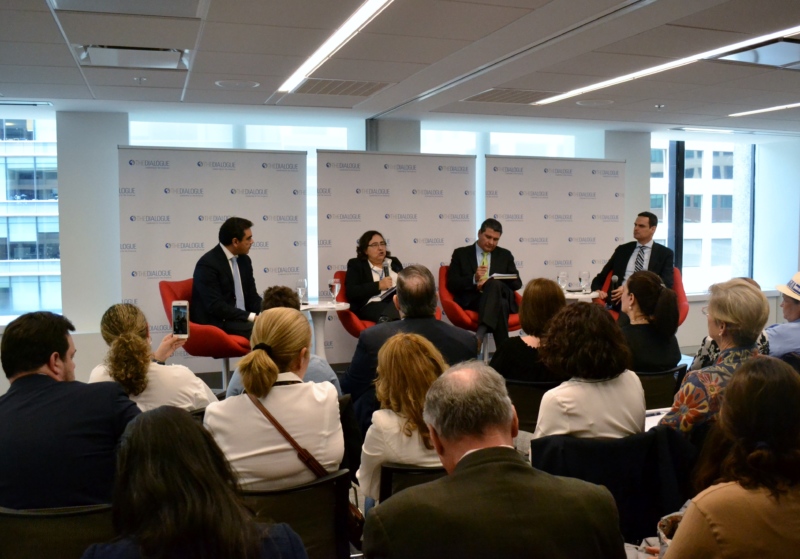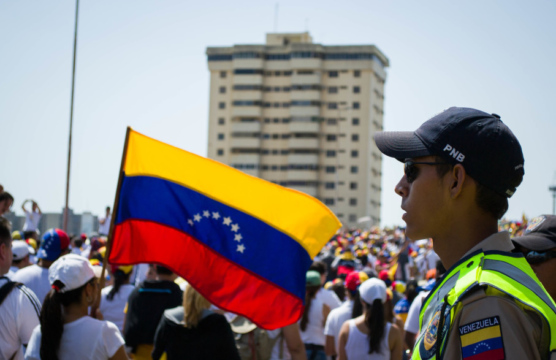A Fatal Blow to Democracy
Nicaragua is on the precipice.
On June 4, the Inter-American Dialogue hosted an event titled “Violence and the Democratic Transition in Nicaragua.” This discussion, moderated by Dr. Manuel Orozco, featured panelists Azahalea Solis from the Movimiento Autónomo de Mujeres, Paulo Abrão from the Inter-American Commission on Human Rights (IACHR), and Juan Sebastián Chamorro from the Nicaraguan Foundation for Economic and Social Development (FUNIDES).
Orozco opened the discussion by describing the deteriorating conditions of democracy and human rights in Nicaragua due to the use of repressive techniques and paramilitary force by President Daniel Ortega. He emphasized the role of civil society and university students in advocating for a dialogue and exerting international pressure on the President, but still admitted that much uncertainty filled the next few weeks for the future of Nicaragua. Paulo Abrão concurred, noting that the IACHR documented systematic repression in its May 2018 visit to Nicaragua. The statistics, collected via hearings and testimonials, included 76 dead, more than 450 detained, and the recurrent usage of sharpshooters, torture, and extrajudicial killings. By early June, the number of dead has increased to 127, with additional repression techniques such as large-scale fires, kidnappings, and attacks on the buses of student demonstrators having also been reported.
“Esta fue una visita histórica, en centenares de testimonios y visitas y lo que escuchamos es una exacerbación generalizada con el gobierno y un rechazo al uso arbitrario de la fuerza, incluso la policial.” - @PauloAbrao #NicaraguaProtests pic.twitter.com/OaPDbn1lod
— The Inter-American Dialogue (@The_Dialogue) June 4, 2018
Orozco then asked Azahalea Solis to address the beginnings of a civil-society lead dialogue in Nicaragua. Solis noted that the repression of Nicaraguan citizens has been the status quo for the past eleven years under the Ortega-Murillo regime. Due to the increased aggression against civilians, citing both the April 19 demonstrations and the May 30 marches, and the failure of the Episcopal Council of Catholic bishops to broker negotiation, the Civic Alliance for Justice and Democracy will now have the responsibility to lead a plenary which ensures the absolute exit of Daniel Ortega as Nicaraguan president.
Juan Sebastián Chamorro then was asked about the economic impact of the current crisis, as well as the role of the Nicaraguan private sector in promoting a democratic transition. Chamorro emphasized the importance of pushing for a dialogue, regardless of how improbable a peaceful transition feels, because the loss of life will be aggravated for every day that a democratic transition is not achieved. Additionally, he stated that the Nicaraguan economy is at a complete standstill, in part because of the increase by citizen roadblocks from 20 to 80.
“La gran demanda es que Ortega y Murillo salgan. El desmantelamiento del estado estalla en un nivel de violencia hacia el pueblo, que termina de desiligitimar moralmente a Ortega.“ - @AzahaleaSolis #NicaraguaProtests pic.twitter.com/MxCk2X4ip8
— The Inter-American Dialogue (@The_Dialogue) June 4, 2018
Orozco followed up with the observation that the Nicaraguan government accepted the IACHR’s investigation, while at the same time, paramilitary forces were shooting at civilians. Abrão emphasized the impartiality of the Organization for American States (OAS), its role supporting the claims of Ortega dissidents, and the 15 recommendations made by the IACHR to address the serious violations of human rights perpetrated by the Ortega-Murillo government. Solis and Chamorro agreed that there was no trust in the justice system or the national police, so it was imperative for civil society to come together, overcome the fear of institutions, and continue seeking a democratic transition for Nicaragua.
The event concluded with an open Q&A with the audience. Questions were raised regarding the similarities with the OAS’ 1979 condemnation of the Anastasio Somoza regime with the situation in Nicaragua today, the next steps for the implementation of the 15 IACHR recommendations, and the role of the international community in helping curtail repressive and paramilitary forces against the Nicaraguan people. Additionally, a statement was made by the widow of Angel Gahona, a Nicaraguan journalist whose April 21 murder was filmed live as he reported on the protests at Bluefields, asking for justice and for an end to repression. The Q&A closed with a special recognition for three Nicaraguan student protestors, who attended the event in person.
Nicaragua is on the precipice.
What will Ortega’s landslide victory allow him to do in his next term?
Events in the Ukraine have lifted the morale of anti-government protestors in Venezuela and elevated their expectations.
 Irene Estefania Gonzalez / Inter-American Dialogue
Irene Estefania Gonzalez / Inter-American Dialogue
